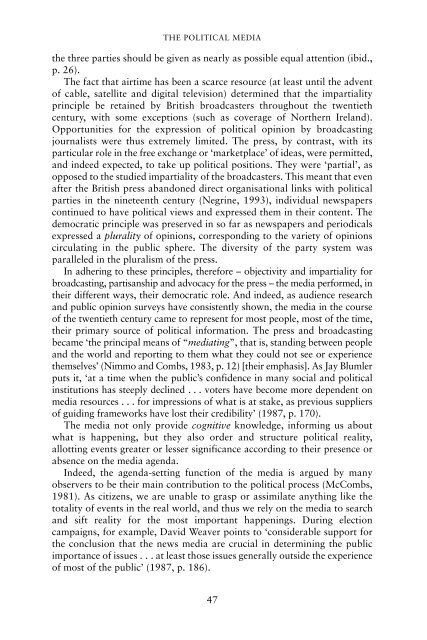20130412164339753295_book_an-introduction-to-political-communication
20130412164339753295_book_an-introduction-to-political-communication
20130412164339753295_book_an-introduction-to-political-communication
You also want an ePaper? Increase the reach of your titles
YUMPU automatically turns print PDFs into web optimized ePapers that Google loves.
THE POLITICAL MEDIA<br />
the three parties should be given as nearly as possible equal attention (ibid.,<br />
p. 26).<br />
The fact that airtime has been a scarce resource (at least until the advent<br />
of cable, satellite <strong>an</strong>d digital television) determined that the impartiality<br />
principle be retained by British broadcasters throughout the twentieth<br />
century, with some exceptions (such as coverage of Northern Irel<strong>an</strong>d).<br />
Opportunities for the expression of <strong>political</strong> opinion by broadcasting<br />
journalists were thus extremely limited. The press, by contrast, with its<br />
particular role in the free exch<strong>an</strong>ge or ‘marketplace’ of ideas, were permitted,<br />
<strong>an</strong>d indeed expected, <strong>to</strong> take up <strong>political</strong> positions. They were ‘partial’, as<br />
opposed <strong>to</strong> the studied impartiality of the broadcasters. This me<strong>an</strong>t that even<br />
after the British press ab<strong>an</strong>doned direct org<strong>an</strong>isational links with <strong>political</strong><br />
parties in the nineteenth century (Negrine, 1993), individual newspapers<br />
continued <strong>to</strong> have <strong>political</strong> views <strong>an</strong>d expressed them in their content. The<br />
democratic principle was preserved in so far as newspapers <strong>an</strong>d periodicals<br />
expressed a plurality of opinions, corresponding <strong>to</strong> the variety of opinions<br />
circulating in the public sphere. The diversity of the party system was<br />
paralleled in the pluralism of the press.<br />
In adhering <strong>to</strong> these principles, therefore – objectivity <strong>an</strong>d impartiality for<br />
broadcasting, partis<strong>an</strong>ship <strong>an</strong>d advocacy for the press – the media performed, in<br />
their different ways, their democratic role. And indeed, as audience research<br />
<strong>an</strong>d public opinion surveys have consistently shown, the media in the course<br />
of the twentieth century came <strong>to</strong> represent for most people, most of the time,<br />
their primary source of <strong>political</strong> information. The press <strong>an</strong>d broadcasting<br />
became ‘the principal me<strong>an</strong>s of “mediating”, that is, st<strong>an</strong>ding between people<br />
<strong>an</strong>d the world <strong>an</strong>d reporting <strong>to</strong> them what they could not see or experience<br />
themselves’ (Nimmo <strong>an</strong>d Combs, 1983, p. 12) [their emphasis]. As Jay Blumler<br />
puts it, ‘at a time when the public’s confidence in m<strong>an</strong>y social <strong>an</strong>d <strong>political</strong><br />
institutions has steeply declined . . . voters have become more dependent on<br />
media resources . . . for impressions of what is at stake, as previous suppliers<br />
of guiding frameworks have lost their credibility’ (1987, p. 170).<br />
The media not only provide cognitive knowledge, informing us about<br />
what is happening, but they also order <strong>an</strong>d structure <strong>political</strong> reality,<br />
allotting events greater or lesser signific<strong>an</strong>ce according <strong>to</strong> their presence or<br />
absence on the media agenda.<br />
Indeed, the agenda-setting function of the media is argued by m<strong>an</strong>y<br />
observers <strong>to</strong> be their main contribution <strong>to</strong> the <strong>political</strong> process (McCombs,<br />
1981). As citizens, we are unable <strong>to</strong> grasp or assimilate <strong>an</strong>ything like the<br />
<strong>to</strong>tality of events in the real world, <strong>an</strong>d thus we rely on the media <strong>to</strong> search<br />
<strong>an</strong>d sift reality for the most import<strong>an</strong>t happenings. During election<br />
campaigns, for example, David Weaver points <strong>to</strong> ‘considerable support for<br />
the conclusion that the news media are crucial in determining the public<br />
import<strong>an</strong>ce of issues . . . at least those issues generally outside the experience<br />
of most of the public’ (1987, p. 186).<br />
47
















